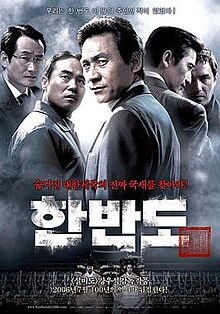This is an old revision of this page, as edited by 211.3.121.72 (talk) at 08:12, 1 March 2008 (rv: Vandalism by Korean user.). The present address (URL) is a permanent link to this revision, which may differ significantly from the current revision.
Revision as of 08:12, 1 March 2008 by 211.3.121.72 (talk) (rv: Vandalism by Korean user.)(diff) ← Previous revision | Latest revision (diff) | Newer revision → (diff) 2006 film| Hanbando | |
|---|---|
 Hanbando movie poster Hanbando movie poster | |
| Directed by | Kang Woo-suk |
| Written by | Kim Hie-jae Lee Hyo-cheol |
| Starring | Ahn Sung-ki Cha In-pyo Jo Jae-hyeon Mun Seong-kun Kang Shin-il |
| Release dates | July 13, 2006 (South Korea) |
| Running time | 147 min. |
| Language | Korean |
Hanbando (한반도) is a 2006 South Korean blockbuster film. However, the number of viewers was not spectacular due to the release of The Host in a similar timeframe.
Plot
Taking place in the not too distant future, North and South Korean governments are on the verge of re-opening the Kyungui Railroad, which connects the two Koreas as a further step toward reunification, when Japan refuses to accept the decision, claiming rights to the railway lines based on official documents imprinted with the royal seal of King Gojong of Joseon a century ago. Yet an age old conspiracy is uncovered where the royal seal with which King Gojong signed the documents is suspected to be fake. It is a race against time and hidden agendas as the South Korean President (Ahn Sung-ki) employs the outspoken historian Choi Min-jae (Jo Jae-hyeon) and the descendant of the Joseon royal bloodline Kim Yu-shik (Kang Shin-il) to find the authentic seal and prevent the history of Japanese occupation from repeating itself. In the meanwhile, Japanese economic sanctions divide the Korean government, and its armed forces appear on the border of Korea threatening its sovereignty. Eventually, the authentic royal seal is found and Japan apologizes for its occupation, allowing viewers to feel catharsis. This probably works well for some, considering the depth of anti-Japanese sentiment.
External links
This Korean film-related article is a stub. You can help Misplaced Pages by expanding it. |
| Cinema of Korea | ||||||||||||||||
|---|---|---|---|---|---|---|---|---|---|---|---|---|---|---|---|---|
| ||||||||||||||||
| ||||||||||||||||
| ||||||||||||||||

